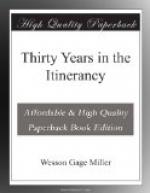During this, the closing year of my term on the District, my labors were very extended. Besides the regular duties of a large District, I added that of aiding in raising regiments for the war. At all suitable times and places, I held war meetings, as they were called, and addressed the people, often finding immense crowds congregated in groves and other convenient localities.
It was in connection with these services that I was nominated for the Colonelcy of a religious regiment, to be raised out of the Churches of the city. But such were my responsibilities at home, where the Government needed all the support it could obtain, it was deemed inadvisable for me to accept. And on further thought it was considered better for the service to avoid such distinctive organizations.
During my term on the District, the annual Camp Meeting at Brookfield greatly prospered. Permanent tents were erected, and the Meeting gave considerable promise of stability. And on these grounds from year to year many persons, were brought into the liberty of the Gospel.
CHAPTER XXI.
Conference of 1862.—The War.—Position of the Conference.—Rev. J.M. Snow.—Appointed again to Spring Street.—Dr. Bowman.—Changes.—Rev. P.S. Bennett.—Rev. C.S. Macreading.—Official Board.-The New Church Enterprise.—Juvenile Missionary Society.—Conference of 1863.—Rev. P.B. Pease.—Rev. George Fellows.—Rev. Samuel Fallows.—Rev. R.B. Curtis.—Rev. D.H. Muller.—Third Year.—Pastoral Work.—Revival. Visit to the Army.—Illness.—Close of Term.
The Conference of 1862 was held Oct. 1st at Kenosha, Bishop Janes presiding. The country was now in the full tide of war. During the year several members of the Conference had gone out as Chaplains, Rev. H.C. Tilton with the Thirteenth Regiment, Rev. C.D. Pillsbury with the Twenty-Second, and Rev. Samuel Fallows with the Thirty-Second.
This was the hour for brave words, and the Wisconsin Conference had them to give. Nor was it in words alone that she was prepared to sustain the Government. Such was the patriotism of the body that her ranks might have been seriously depleted at any time, if it could have been done with safety to the interests of the country. But it was conceded that the Government must now have a vigorous support at home. Partisan feeling in the late canvass had greatly demoralized the people, and a strong moral influence was needed to rightly shape the tone of public sentiment. In fact, it was necessary throughout the struggle that the Churches, under the lead of the clergy, should act the part of Aaron and Hur, in sustaining the Government.




